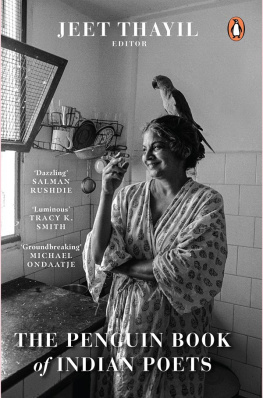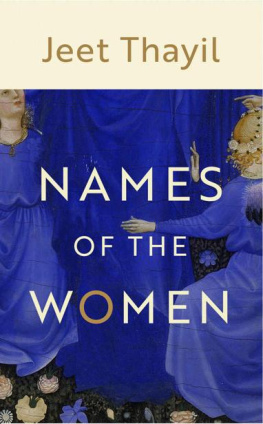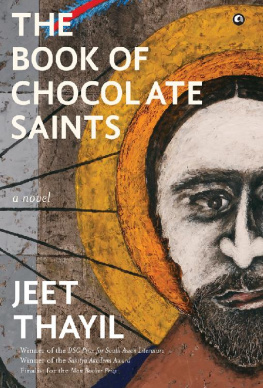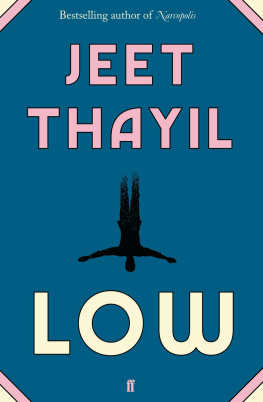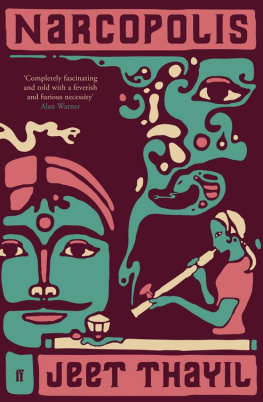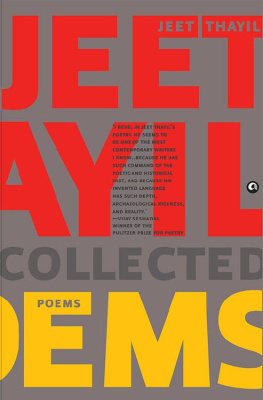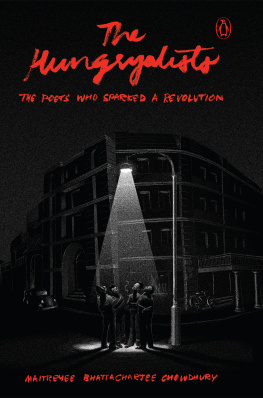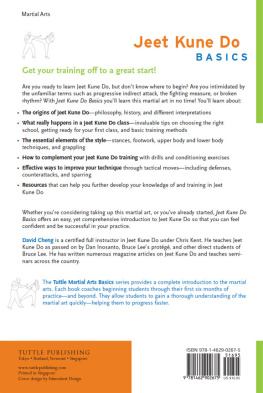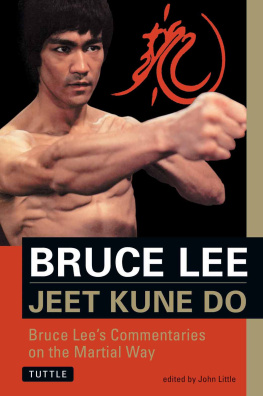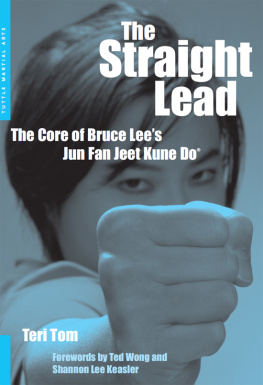Jeet Thayil - The Penguin Book of Indian Poets
Here you can read online Jeet Thayil - The Penguin Book of Indian Poets full text of the book (entire story) in english for free. Download pdf and epub, get meaning, cover and reviews about this ebook. year: 2022, publisher: Penguin Group, genre: Detective and thriller. Description of the work, (preface) as well as reviews are available. Best literature library LitArk.com created for fans of good reading and offers a wide selection of genres:
Romance novel
Science fiction
Adventure
Detective
Science
History
Home and family
Prose
Art
Politics
Computer
Non-fiction
Religion
Business
Children
Humor
Choose a favorite category and find really read worthwhile books. Enjoy immersion in the world of imagination, feel the emotions of the characters or learn something new for yourself, make an fascinating discovery.
- Book:The Penguin Book of Indian Poets
- Author:
- Publisher:Penguin Group
- Genre:
- Year:2022
- Rating:3 / 5
- Favourites:Add to favourites
- Your mark:
- 60
- 1
- 2
- 3
- 4
- 5
The Penguin Book of Indian Poets: summary, description and annotation
We offer to read an annotation, description, summary or preface (depends on what the author of the book "The Penguin Book of Indian Poets" wrote himself). If you haven't found the necessary information about the book — write in the comments, we will try to find it.
The Penguin Book of Indian Poets — read online for free the complete book (whole text) full work
Below is the text of the book, divided by pages. System saving the place of the last page read, allows you to conveniently read the book "The Penguin Book of Indian Poets" online for free, without having to search again every time where you left off. Put a bookmark, and you can go to the page where you finished reading at any time.
Font size:
Interval:
Bookmark:



PENGUIN BOOKS

PENGUIN BOOKS
A delight to read. Salman Rushdie More than an anthology, this is a luminous constellationa gathering of souls, across time and space, in urgent conversation about what it means to be human. Tracy K. Smith A groundbreaking anthology of poetry from Indiafull of verve, craft, politics, passionwith new voices alongside the old so the book echoes across generations and feels like a true literary dialogue. A thrillingly discovered map for our time where even the biographies are vivid and internationally various in their geographies and influences. Michael Ondaatje ALSO BY JEET THAYIL FICTION Names of the WomenLowThe Book of Chocolate SaintsNarcopolis POETRY Collected PoemsThese Errors are CorrectEnglishApocalypsoGemini (Two-Poet Volume with Vijay Nambisan) AS EDITOR The Bloodaxe Book of Contemporary Indian Poets60 Indian PoetsDivided Time: India and the End of Diaspora LIBRETTI Babur in LondonTalk is Cheap This book is dedicated to the poets who died: Deepankar Khiwani in 2020; Meena Alexander in 2018; Eunice de Souza and Vijay Nambisan in 2017; Ajithan Kurup in 2014; Kamala Das and Dilip Chitre in 2009; Revathy Gopal and Kersy Katrak in 2007; Santan Rodrigues in 2006; Nissim Ezekiel, Dom Moraes and Arun Kolatkar in 2004; Gopal Honnalgere in 2003; Agha Shahid Ali in 2001; G.S.
Sharat Chandra in 2000; Srinivas Rayaprol in 1998; Lawrence Bantleman in 1995; A.K. Ramanujan in 1993.
Unsurprisingly, the book developed an end-of-the-world climate all its own, a sense of catastrophic atmospheric changes: democracy and reality were under attack and the world was in the midst of an era-defining paroxysm. We were witness to the struggle between the desperate regimes of authoritarian old men and a brash new world clamouring to be born. From this came the idea of extinction, and extinctions music, and a climactic archiving. There are ninety-four poets in this anthology, of whom forty-nine are women and forty-five men. Three quarters of a century separate the oldest poet, born in 1924, from the youngest, born in 2001.  For Indian poets writing in English, modernism arrived at roughly the same time as Independence, which is to say after it had already established itself as the new orthodoxy in other parts of the world.
For Indian poets writing in English, modernism arrived at roughly the same time as Independence, which is to say after it had already established itself as the new orthodoxy in other parts of the world.  For Indian poets writing in English, modernism arrived at roughly the same time as Independence, which is to say after it had already established itself as the new orthodoxy in other parts of the world.
For Indian poets writing in English, modernism arrived at roughly the same time as Independence, which is to say after it had already established itself as the new orthodoxy in other parts of the world.
It came to regional Indian languages long before it came to English. In Marathi, to take one instance, the modernist movement attempted to recast seemingly immovable social divisions, including those of caste, in a literature that was nothing if not indigenous. These writers were in a hurry to overthrow the conventions of the Indian bourgeoisie as well as those of their former colonial masters. Later Marathi modernists (such as Chitre and Kolatkar) owed their allegiance not to British but to European and American poetry, particularly to the Surrealists and the Beats. Indian poetry in English took longer to emerge from the influence of English poetryby no means a situation peculiar to verse. The most prominent Indian modernists of the fifties, Nissim Ezekiel and Dom Moraes, shaped the canon and cleared the way, but the sounds they made were British and they confined even their experimentation to the essential iamb.
It wasnt until the seventies that Internationalism established itself on the English page in India, with the Clearing House editions of Eunice de Souza, Adil Jussawalla, Jayanta Mahapatra, Arvind Krishna Mehrotra and Arun Kolatkar, and with the psychic weather poets such as A.K. Ramanujan, Kamala Das and R. Parthasarathy brought to their lines. The next generation of Indian poets, the poets of the eighties and nineties in Bombay and other cities, were more conservative in some ways than their immediate forebears, and there was a return to the canonical influence of mid-twentieth-century British poetry. But by the second decade of the twenty-first century there had been a flowering, an uprising, and a new generation of poets who cared little about the usual poetry presses, who published poems on the Internet and rewrote the canon in their own performative or spoken or gender-fluid image. To demonstrate the range and variety among Indian poets since Independence, this anthology includes poets who live in places other than the urban centres of India, who trace their imaginative lineage to Faiz, Szymborska, Plath and Lorca, rather than to Walcott, Auden, Eliot and Pound.
It returns forgotten figures such as Lawrence Bantleman, Gopal Honnalgere and Srinivas Rayaprol to the centre stage where they belong, and it connects poets who have never before shared a stage. A chronological parade of poets is as arbitrary as one that is alphabetical. The arrangement in these pages bypasses those systems for the pleasures of verticality. By placing Ezekiel beside Anindita Sengupta, born half a century later and writing to a transformed poetic and social milieu, it is possible to see genetic connections not only in tone but in formal preference. This system of placement, or displacement, may make it difficult to form a quick, superficial assessment, but it gives the reader a more lasting understandingof how vast, how riverine is the poetry, and a sense of its currents and vitality. 
Font size:
Interval:
Bookmark:
Similar books «The Penguin Book of Indian Poets»
Look at similar books to The Penguin Book of Indian Poets. We have selected literature similar in name and meaning in the hope of providing readers with more options to find new, interesting, not yet read works.
Discussion, reviews of the book The Penguin Book of Indian Poets and just readers' own opinions. Leave your comments, write what you think about the work, its meaning or the main characters. Specify what exactly you liked and what you didn't like, and why you think so.

